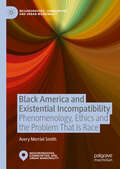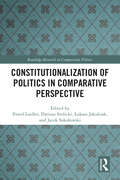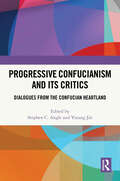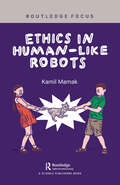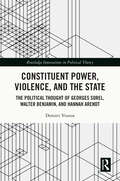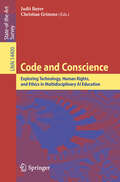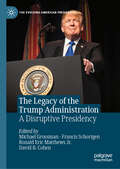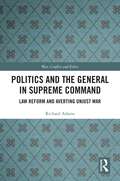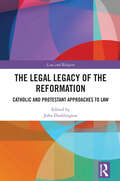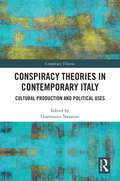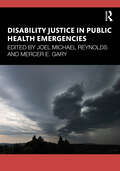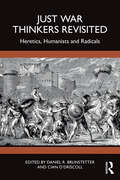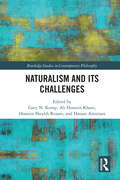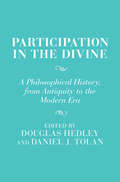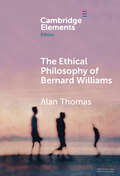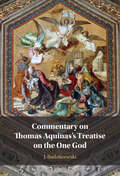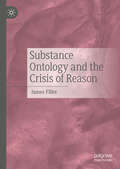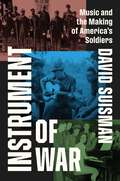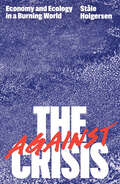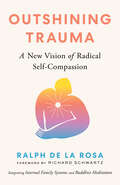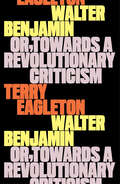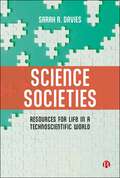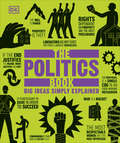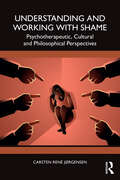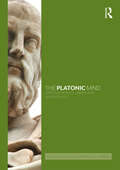- Table View
- List View
Black America and Existential Incompatibility: Phenomenology, Ethics and the Problem That Is Race (Neighborhoods, Communities, and Urban Marginality)
by Avery Merriel SmithWithin the context of W.E.B. Du Bois’ question “How does it feel to be a problem?”, this volume examines the “problem” using a phenomenological approach, that is to say, in terms of one’s experience of such. More specifically, the author explores three points: the Black person’s experience of being a problem for White America; her experience of White America as a problem or obstacle for their survival and ability to thrive; and her experience of navigating, negotiating and surviving a world that is presented as a duality. This book deconstructs the world(s) that the Black person experiences by first understanding her as a “Dasein” (the Heideggerian concept of a being that is aware of its being in the world and aware of other beings that are in the world it experiences). In considering the Black person as a Dasein, the author affirms the intrinsic value of her being and, therefore, validates the experience she has of the world in which she finds herself. Finally, this volume incorporates Emmanuel Levinas’ philosophy of the face and Paul Ricoeur’s study of the self to help craft an understanding of the ontology of human relationship to support the advocacy for an ethical encounter between the Black person and those whom she encounters in both the Black world and the White world in which she must navigate and concurrently exist.
Constitutionalization of Politics in Comparative Perspective (Routledge Research in Comparative Politics)
by Paweł Laidler Dariusz Stolicki Łukasz Jakubiak Jacek SokołowskiScholars from political science and law examine the latest research on the constitutionalization of politics in comparative perspective.The scope includes both inter- country and intra- country perspectives, institutional and systemic analyses, common and civil law systems, focusing on historical and contemporary case studies. There are chapters limited to a concrete legal and political system, analyzing the tools and processes guarding constitutionalization of politics in such countries as the United States, Germany, France, Italy, Poland, Finland, and Bulgaria, as well as studies offering comparative analysis of various institutions representing different countries and different legal and political systems. Taken together, this book uncovers a wide variety of legal and political cultures, systems of governments, and forms of territorial organization. Once uncovered, this approach makes it easier to determine repetitive patterns which may be observed in constitutional review and constitutional interpretation, or significant differences occurring in the models of constitutionalization of politics around the world.Constitutionalization of Politics in Comparative Perspective tackles important debates among academics interested in the theoretical and practical aspects of constitutions and constitutionalism and will appeal to social scientists, including sociologists, philosophers, security studies and international relations experts but also cultural studies scholars.
Progressive Confucianism and its Critics: Dialogues from the Confucian Heartland
by Stephen C. Angle Yutang JinIn the spring of 2017, US-based Confucian philosopher Stephen C. Angle took part in a series of dialogues with Chinese Confucians in Beijing. The dialogues engage with topics like the relation between Confucianism and modernity; whether Confucianism should be understood as philosophy, religion, or chief ingredient in a distinctively Chinese culture; the status of pivotal modern Confucians like Kang Youwei and Mou Zongsan; and more generally, the prospects for what Angle calls “Progressive Confucianism.” The present book offers translations of those dialogues into English, together with epilogues by the two editors reflecting on what the dialogues tell us about the contemporary prospects for Confucianism.
Ethics in Human-like Robots
by Kamil MamakThe idea of creating artificial humans can be found at the beginning of the human culture. Ancient myths contain the stories of artificial humans brought to life by gods. The word robot originates from a play that was about artificial humans made from artificial flesh that aims to serve real humans. With advancements in robotics, the materialization of this idea is more real than ever before. We are witnessing attempts to create humanoid robots that might be deployed in many spheres of our life - policing, healthcare, and even for love and sex.The book focuses on the ethical issues of human likeness of robots and human tendency to anthropomorphize. It is built on the assumption that design choices are not neutral, and they need to be discussed to align robots with human values. With robots operating in the physical world, they bring ideas and risks that should be addressed before widespread deployment. The book reviews specific issues and provides suggestions and recommendations for improving robots to serve humans better. It draws on literature from Human-Robot Interactions, ethics of AI and robotics, and the philosophy of technology.
Constituent Power, Violence, and the State: The Political Thought of Georges Sorel, Walter Benjamin, and Hannah Arendt (Routledge Innovations in Political Theory)
by Dimitri VourosIn Constituent Power, Violence, and the State, Dimitri Vouros examines the question of political violence by placing the thought of Georges Sorel, Walter Benjamin, and Hannah Arendt in conversation with contemporary theories of sovereignty and constituent power.Vouros argues that the violence sustaining the modern state inhibits institutional accountability and derails constituent power. The paradox of modern law—which is both the expression of the people’s will but also alienated from them—sets the stage for political contestation. For Vouros, the multitude’s potentiality is actualized through either organized or spontaneous acts of resistance against state force. Antagonism is therefore a key element of the political and must be included in any theory of political agonism. A strong notion of constituent power ensures the integrity of the public sphere and the expansion of citizens’ political agency. Bringing all these ideas together is unique for this field of investigation.Accessible and engagingly written, Constituent Power, Violence, and the State is a must read for researchers in political theory and political philosophy. Critical legal studies scholars and social theorists will also profit from this book.
Code and Conscience: Exploring Technology, Human Rights, and Ethics in Multidisciplinary AI Education (Lecture Notes in Computer Science #14400)
by Christian Grimme Judit BayerThis volume originated from an international, interdisciplinary research course organized by the Institute of Information Management of the University of Münster in 2021-2022, funded by the DAAD IVAC sponsorship program. The coauthors and their contributions represent different disciplines, fusing perspectives of law and information sciences. The contributions present current issues in AI, ethics and human rights, policing, privacy and surveillance, social media, and data protection. The book has a further mission: it offers insight into a novel educational format that combines an intercultural learning environment with interdisciplinary co-working, e-learning methods, peer education, and interactive group work.
The Legacy of the Trump Administration: A Disruptive Presidency (The Evolving American Presidency)
by Michael Grossman David B. Cohen Francis Schortgen Ronald Eric Matthews Jr.This book analyzes the legacy of the first Trump administration on a variety of different fronts. Whether it was the extensive use of Twitter, the tendency to express controversial, and often dubious views, or to even slander foreign leaders, Trump was a disruptive president. The presidency of Donald Trump raises questions for political scientists and researchers. How consequential was he? While he garnered much attention both in and out of the White House, how much of his legacy remains? The authors in this book address these questions with essays that cover an array of issues related to his tenure in office, and the years since. The chapters provide a broad analysis of the legacy of the Trump presidency, focusing on all aspects of his presidency and representing multiple perspectives across the partisan and disciplinary divides. Additionally, the contributions in this book aim to (re-)assess the Trump legacy in light of the subsequent efforts by his successor to undo much of the policies embraced by and implemented during the Trump years.
Politics and the General in Supreme Command: Law Reform and Averting Unjust War (War, Conflict and Ethics)
by Richard AdamsThis book argues for reform of the convention that, when politicians decide on a course of action, the general in supreme command obeys without question.The entire spread‑out chain of command is unified in the general, who offers the only connection between the military and politics. Offering the sole connection between the military and politics, only the general can turn political directions into military command and capacitate war. Thus, the general has unique opportunity to resist unconscionable direction to launch an unjust war or to conduct or expand war unjustly. This book argues for reform, so the general has the right in law to refuse direction which is lawful, but awful. The legal capacity to refuse would mean the general would be expected to act responsibly, not merely as the unresisting pawn of politics. Such reform, creating legal opportunity for the supreme command to refuse lawful but unconscionable directives, might avert unjust war.This book will be of much interest to students of the ethics of war, civil‑military relations, and international relations.
The Legal Legacy of the Reformation: Catholic and Protestant Approaches to Law (Law and Religion)
by John DuddingtonThe growing interest in the relationship between religion and law is, in the case of Christianity, often viewed in monolithic terms. Moreover, the debate is often seen in terms of the relationship of Christianity to the state along with discussions about, for example, religious freedom. Christianity is often seen as responding to claims made on it by the state and by the growth of secularism.This book takes a different approach. First, it makes the claim that Christianity has something of value to say about various pressing issues which are of direct relevance to contemporary society. Amongst these are the place of human rights and that of individual claims of conscience. Second, it does not regard Christianity as a monolithic whole but takes as its starting point the sundering of Christendom at the Reformation, which, it claims, led in many cases to divergent patterns of thought between Catholics and Protestants about law and its place in society. However, as this book shows, in many cases, Catholic and Protestant thinking on areas such as natural law is not as divergent as it is often thought.Five hundred years after the Reformation, the work presents a reflection on the roots of Catholic and Protestant thinking on law and its place in society. It will be of interest to canon lawyers as well as academics and students of law and religion.
Conspiracy Theories in Contemporary Italy: Cultural Production and Political Uses (Conspiracy Theories)
by Gianmarco NavariniThis volume explores the role played by conspiracy narratives in the contemporary Italian political, cultural, and social context, through a series of case studies.It begins with a historical and genealogical account of the troubled success of Italian conspiracy thinking from the early 1970s to the present day. Among the issues examined are the unclear division between legitimate/illegitimate forms of knowledge, the use of conspiracy as a confrontational discursive device, the emergence of moral panic, and the stabilization of information outlets against dominant official explanations. The analysis covers the case of a well-known national survey, and a digital platform specializing in conspiracy storytelling. The second axis of the book concerns the pervasive use of conspiracy as a theory or narrative that currently circulates in various Italian cultural fields: multiculturalism, immigration, and racism; Catholic traditionalism; football fandom; small business economics; and cooking and food.This volume will be of interest to researchers of conspiracy theories, and Italian politics and history.
Disability Justice in Public Health Emergencies
by Joel Michael Reynolds Mercer E. GaryDisability Justice in Public Health Emergencies is the first book to highlight contributions from critical disability scholarship to the fields of public health ethics and disaster ethics. It takes up such contributions with the aim of charting a path forward for clinicians, bioethicists, public health experts, and anyone involved in emergency planning to better care for disabled people—and thereby for all people—in the future. Across 11 chapters, the contributors detail how existing public health emergency responses have failed and still fail to address the multi-faceted needs of disabled people. They analyze complications in the context of epidemic and pandemic disease and emphasize that vulnerabilities imposed upon disabled people track and foster patterns of racial and class domination.The central claim of the volume is that the ethical and political insights of disability theory and activism provide key resources for equitable disaster planning for all. The volume builds upon the existing efforts of disability communities to articulate emergency planning priorities and response measures that take into account the large body of qualitative and quantitative research on disabled people’s health, needs, and experiences. It is only by listening to disabled people’s voices that we will all fare better in future public health emergencies.The book will be of interest to scholars and graduate students working in bioethics, disability studies, public health policy, medical sociology, and the medical humanities.
Just War Thinkers Revisited: Heretics, Humanists and Radicals (War, Conflict and Ethics)
by Daniel R. Brunstetter Cian O’DriscollThis book comprises essays that focus on a range of thinkers who challenge the boundaries of the just war tradition.The ethics of war scholarship has become a rigid and highly disciplined activity, closely associated with a very particular canon of thinkers. This volume moves beyond this by presenting thinkers not typically regarded as part of that canon but who have interesting and potentially important things to say about the ethics of war. The book presents 20 profile essays on an eclectic cast of heretics, humanists, and radicals, from ancient Greece to the twenty-first century, who lived through and theorized about violence. The book asks how ethics of war scholars might benefit from engaging with them. Some of these thinkers engage directly with—to augment or criticize—the just war tradition, while others contribute to military thinking across the ages, pushing the boundaries of what was acceptable in war. Many proffer alternative moral frameworks regarding the legitimacy of political violence. The present volume thus invites scholars to reconsider the ethics of war in a way that challenges the standard delineation between just war theory, realism, and pacifism and to reflect on how those positions might inform our own approach to these matters.This book will be of much interest to students of just war theory, ethics of war, war studies, and International Relations.
Naturalism and Its Challenges (Routledge Studies in Contemporary Philosophy)
by Gary N. Kemp Ali Hossein Khani Hossein Sheykh Rezaee Hassan AmiriaraThis volume features new essays on the application, justification, and role of naturalism in philosophical inquiry. It serves as an important update on current controversies about naturalism.The contributors include leading figures who have written on naturalism and its relevance to a wide range of issues across philosophical subdisciplines. The chapters discuss how naturalism can be properly employed in different philosophical areas such as epistemology, metaphysics, philosophy of mind, philosophy of language, philosophy of religion, philosophy of time, philosophy of science, philosophy of mathematics, philosophy of memory, cognitive science, ethics, meta-ethics, and normativity.Naturalism and Its Challenges will be of interest to scholars and advanced students working in a wide range of philosophical disciplines.
Participation in the Divine: A Philosophical History, From Antiquity to the Modern Era (Cambridge Studies in Religion and Platonism)
by Douglas Hedley Daniel J. TolanThe concept of participation in a transcendent domain of existence is central to the Platonic and the Judaeo-Christian traditions. It is how thinkers throughout history have justified existence itself, explaining temporal being vis-à-vis God. Yet in the wake of secularisation and the widespread phenomenon of disenchantment, this once ubiquitous and coveted notion has fallen into desuetude. The essays in this volume analyse and explore this key concept in the history of Western thought. They provide, for the first time, a rigorous and accessible account of participation, a pivotal concept in Western philosophy and theology, from antiquity to the modern era. Bringing together contributions by an international team of leading scholars of the Platonic tradition, the volume challenges a standard distinction between philosophy and theology. It also enables a comprehensive understanding of figures who do not fit neatly into the modern university's division of these subjects.
The Ethical Philosophy of Bernard Williams (Elements in Ethics)
by Alan ThomasThis Element surveys the main claims of Bernard Williams's ethical philosophy. Topics include ethical scepticism, virtue, reasons for action, the critique of the Morality System, moral realism and the nature of theorising in ethics.
Commentary on Thomas Aquinas's Treatise on the One God
by J. BudziszewskiThomas Aquinas's classic Treatise on the One God is one of the greatest works ever written in the history of philosophy and theology. During the first half of the twentieth century, philosophy of religion was widely viewed as dead, not even a domain of serious questions but only of 'pseudo-questions.' Surprisingly, not only did the supposed corpse rise from the dead, but religion once again became one of the most active fields of philosophical investigation. The time could not be more fitting for a reinvestigation of Treatise on the One God, which opens the massive Summa theologiae. In this unparalleled exploration of the Treatise's penetrating arguments J. Budziszewski explores and illuminates the text with a luminous line-by-line commentary. Supplemented with thematic discussions, this book discusses not only the Treatise itself, but also its immediate relevance to contemporary thought and issues of the modern world. This work fittingly closes the author's series of commentaries on the Summa Theologiae.
Substance Ontology and the Crisis of Reason
by James FillerIn this book, James Filler traces the history of Being, understood as substance, from Parmenides through the Scholastics and ending with Descartes, in whom this understanding reaches a crisis. He further shows how this understanding inherently leads to serious ontological problems which are unresolvable within a substance ontological approach. It is this substance understanding which has dominated, but this view--with its emphasis on distinctness, independence, and separateness--will create insurmountable problems which ultimately lead to a crisis of thought after Descartes. The book examines this substance understanding, how it has historically shaped the understanding of Being, and how this understanding ultimately becomes ontologically and epistemologically destructive.
Instrument of War: Music and the Making of America's Soldiers
by David SuismanAn original history of music in the lives of American soldiers. Since the Civil War, music has coursed through the United States military. Soldiers have sung while marching, listened to phonographs and armed forces radio, and packed the seats at large-scale USO shows. “Reveille” has roused soldiers in the morning and “Taps” has marked the end of a long day. Whether the sounds came from brass instruments, weary and homesick singers, or a pair of heavily used earbuds, where there was war, there was music, too. Instrument of War is a first-of-its-kind study of music in the lives of American soldiers. Although musical activity has been part of war since time immemorial, the significance of the US military as a musical institution has generally gone unnoticed. Historian David Suisman traces how the US military used—and continues to use—music to train soldiers and regulate military life, and how soldiers themselves have turned to music to cope with war’s emotional and psychological realities. Opening our ears to these practices, Suisman reveals how music has enabled more than a century and a half of American war-making. Instrument of War unsettles assumptions about music as a force of uplift and beauty, demonstrating how it has also been entangled in large-scale state violence. Whether it involves chanting “Sound off!” in basic training, switching on a phonograph or radio, or cueing up an iPod playlist while out on patrol, the sound of music has long resonated in soldiers’ wartime experiences. Now we all can finally hear it.
Against the Crisis: Economy and Ecology in a Burning World
by Ståle HolgersenCapitalism produces crises and crises reproduce capitalism. We need an ecosocialist way outIf crisis defines our era, we need a coherent socialist policy in response. Ståle Holgersen delves into today&’s economic and ecological crises to demonstrate that they are not exceptions to an otherwise functioning system but integral to its operation. It is naive to see these upheavals as opportunities for reform or revolution. They are the bedrock of the status quo. Fortunately, the vicious circle sustaining capitalism is not founded on an iron law. Our historical mission in the face of the climate crisis is to create a historical exception to the rule. It is time for ecosocialism against crisis.
Outshining Trauma: A New Vision of Radical Self-Compassion Integrating Internal Family Systems and Buddhist Meditation
by Ralph De La RosaDiscover a path of post-traumatic growth, spiritual insight, and deep compassion for the most challenging parts of yourself.Ralph De La Rosa integrates Richard Schwartz&’s revolutionary Internal Family Systems (IFS) model with Buddhist meditation practice to offer a radically different healing paradigm.If you&’re among those who&’ve tried therapy and meditation but wonder why you still suffer repetitive patterns and emotions, Outshining Trauma is for you. De La Rosa places the innovative, evidence-based model of IFS in the context of Buddhist meditation to show that the process of healing trauma can lead you to your deepest spiritual nature. This book offers clear conceptual frameworks to understand trauma, post-traumatic growth, and the close relationship between healing trauma and spirituality. The many journal prompts, experiential practices, and guided meditations will teach you how to:See that your mind is made up of disparate &“parts&” that carry their own views and intentions which can become stuck in traumatic experiencesRecognize common types of inner parts in the IFS model, such as &“Managers,&” &“Firefighters,&” and &“Exiles&”Separate from a part inside of you that&’s holding grief, pain, or other difficult feelings and then elicit its concerns and wisdomUtilize meditation as a method for opening to transformative self-compassion and self-loveA survivor himself of depression, PTSD, and addiction, De La Rosa shares gripping, inspirational life stories to demonstrate the path of outshining trauma.
Walter Benjamin: Or, Towards a Revolutionary Criticism
by Terry EagletonFrom our finest radical literary analyst, a classic study of the great philosopher and cultural theorist.
Science Societies: Resources for Life in a Technoscientific World
by Sarah R. DaviesWhat role do science and technology play in society? What is the nature of expert knowledge? What is science’s relation to democracy? This introduction to science, technology, and society answers these questions, and more, by exploring contemporary research on topics such as expertise, activism, science policy, and innovation. It offers a comprehensive resource for considering the place that science and technology have in contemporary societies, and the roles that they can and should play. Accessible to a non-specialist audience, it draws on a rich range of cases and examples, from nuclear activism in India to content moderation in Kenya. Framing science as always social, and society as always shaped by science and technology, it asks: what worlds do we want science and technology to bring into being?
The Politics Book: Big Ideas Simply Explained (DK Big Ideas)
by DKLearn about how the world of government and power works in The Politics Book.Part of the fascinating Big Ideas series, this book tackles tricky topics and themes in a simple and easy to follow format. Learn about Politics in this overview guide to the subject, great for novices looking to find out more and experts wishing to refresh their knowledge alike! The Politics Book brings a fresh and vibrant take on the topic through eye-catching graphics and diagrams to immerse yourself in. This captivating book will broaden your understanding of Politics, with:- More than 100 groundbreaking ideas in the history of political thought- Packed with facts, charts, timelines and graphs to help explain core concepts- A visual approach to big subjects with striking illustrations and graphics throughout- Easy to follow text makes topics accessible for people at any level of understandingThe Politics Book is a captivating introduction to the world's greatest thinkers and their political big ideas that continue to shape our lives today, aimed at adults with an interest in the subject and students wanting to gain more of an overview. Delve into the development of long-running themes, like attitudes to democracy and violence, developed by thinkers from Confucius in ancient China to Mahatma Gandhi in 20th-century India, all through exciting text and bold graphics.Your Politics Questions, Simply ExplainedThis engaging overview explores the big political ideas such as capitalism, communism, and fascism, exploring their beginnings and social contexts - and the political thinkers who have made significant contributions. If you thought it was difficult to learn about governing bodies and affairs, The Politics Book presents key information in a clear layout. Learn about the ideas of ancient and medieval philosophers and statesmen, as well as the key personalities of the 16th to the 21st centuries that have shaped political thinking, policy, and statecraft.The Big Ideas SeriesWith millions of copies sold worldwide, The Politics Book is part of the award-winning Big Ideas series from DK. The series uses striking graphics along with engaging writing, making big topics easy to understand.
Understanding and Working with Shame: Psychotherapeutic, Cultural and Philosophical Perspectives
by Carsten René JørgensenThis book discusses the pivotal role of shame in a wide range of mental disorders and as a driving force in societal polarization and escalating conflicts between nations and population groups.Exploring the phenomenology of one of the most vulnerable and painful of human emotions, shame, Jørgensen dives deep into its many facets and the ways in which it manifests in mental illnesses and everyday life. Delving into an in-depth discussion of the differentiation between the moral and ethical feelings of guilt and shame, he presses the need to distinguish between constructive and destructive feelings of shame. He examines how shame permeates societal and cultural expectations, on both individual and collective levels. Solution-centric in its approach, the author not only discusses the destructive feelings of shame particularly common among individuals with more severe mental disorders, but also offers specific advice to therapists on how to deal with it.The book will be an essential read for psychoanalysts, psychotherapists, philosophers, and anyone wanting to understand the power of shame in our lives.
The Platonic Mind (Routledge Philosophical Minds)
by Vasilis Politis Peter D. LarsenPlato is one of the most widely read and studied philosophers of all time. A pivotal figure in the history of philosophy, his work is foundational to the Western philosophical tradition.The Platonic Mind provides an extensive survey of his work, not only placing it in its historical context but also exploring its contemporary significance. Comprising over 30 specially commissioned chapters by an international team of contributors, the volume is divided into three clear parts: Reading Plato’s Dialogues Themes From Plato Plato’s Influences and Significance Within these sections key topics are addressed including the nature of reality and the physical world; human cognition, including knowledge, sense perception, and affective states; society, politics, and law; his method of inquiry and literary style; his influence on subsequent thinkers and traditions; and studies on a wide range of individual Platonic dialogues.Plato’s work is central to the study of ancient philosophy, Greek philosophy, history of philosophy, metaphysics, philosophy of mind, political philosophy, epistemology, philosophy of science, ethics, philosophy of language, legal philosophy, and philosophy of religion. As such The Platonic Mind is essential reading for all students and researchers in philosophy. It will also be of interest to those studying Plato in related disciplines such as politics, law, ancient history, literature, and religious studies.
